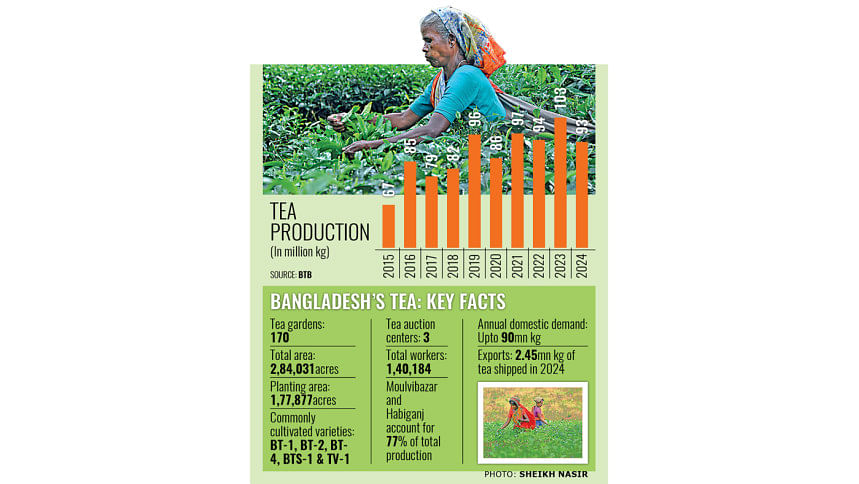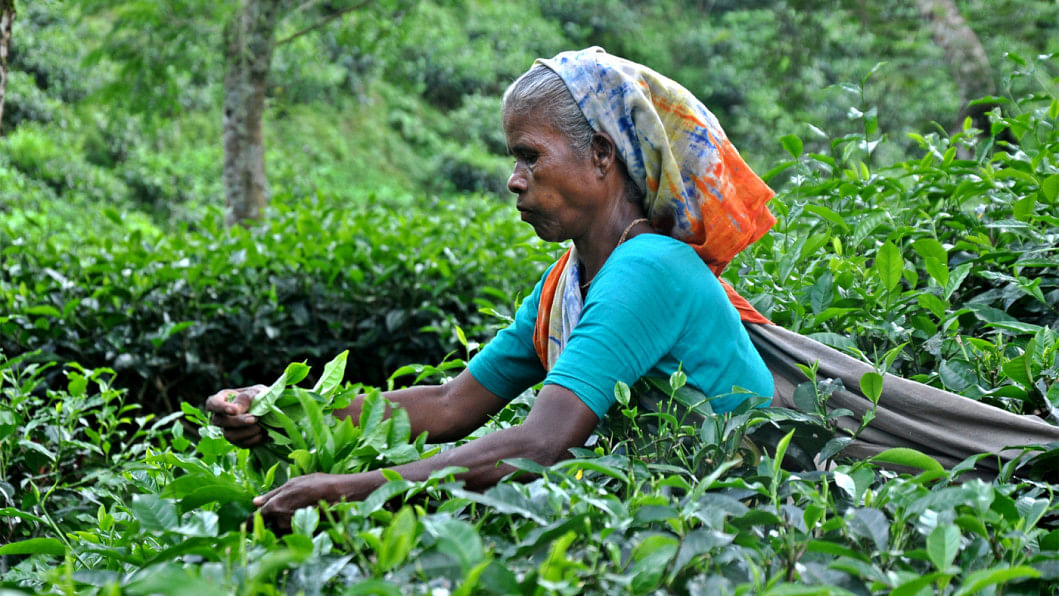Only 5 of 28 locally developed tea varieties popular

Out of the 28 varieties of tea plants developed by state-run Bangladesh Tea Research Institute (BTRI), only five are widely cultivated in the country, based on their high yield, quality, and climate resilience.
These varieties are also called tea clones -- plants produced through vegetative propagation like cuttings or grafting from a single, selected parent plant, rather than from seeds.
This method allows for the creation of genetically identical plants with specific desirable traits, like high yield or disease resistance.
The five clones, named BT-1 (developed in 1966), BT-2 (1975), BT-4 (1981), BTS-1 (1985), and TV-1 (1949), yield around 3,000 to 4,000 kilogrammes (kg) of tea per hectare on average, said BTRI Director Md Ismail Hossain.
BT-2 is the most popular due to its drought tolerance and flavour resembling Darjeeling tea, which is appreciated for its delicate taste, floral aroma, and wine-like notes reminiscent of muscat grapes, he added.
Speaking to The Daily Star yesterday, Hossain said BT-2 can be used to produce premium-quality black tea and green tea.
However, he added that, given the size of the country's tea industry, the number of clones developed so far is not sufficient and research is ongoing for new ones.
Traditionally, people tend to trust what is old and proven -- and the same holds true in the tea sector, he said. Tea garden owners prefer cultivating older, tried-and-tested clones, while adoption of newer ones remains limited, the researcher also added.
As such, garden owners usually cultivate three to five select clones to ensure that their operations are not commercially affected in any way, he added.
He informed that developing a high-quality clone takes around 13 years and its economic lifespan is around 50 years.
However, industry insiders said this has led to a lack of product diversification.

Tea garden owners said the BTRI needs to develop more clones focusing on climate resilience and high quality to boost tea production and sales.
Bangladesh's tea industry dates back 184 years. There are currently 170 tea gardens, mostly in the northeast. In 2024, 93.04 million kg of tea was produced in the country against an annual demand of 85–90 million kg, according to industry sources.
What tea garden owners and officials say
An official of one of the leading tea manufacturers, requesting anonymity, said they were cultivating BT-2 on nearly 50 percent of their plantation area given its high yield, quality, low susceptibility to pest attacks, drought tolerance, and low mortality rate.
They also planted TV-1, said the official, opining that more clones, focused on climate resilience for product diversification, were required.
Luthful Kabir Shaheen, director of business development at City Group, a leading conglomerate which owns the Bengal Tea brand and eight tea gardens, said their plants include the popular BT 1, BT 2 and TV 1 varieties.
"These clones have been prioritised due to their climate resilience, superior aroma, and sweetness, which make them more desirable in the market," he said.
Kamran Tanvirur Rahman, chairman of the Bangladesh Tea Association (BTA), a platform of tea garden owners, said there was a shortage of high-yield varieties and the BTRI needs to focus on this.
More drought-tolerant clones must also be developed as the country experiences little to no rainfall for five to six months of the year. Irrigation is not feasible everywhere, as it would increase production costs, he added.

 For all latest news, follow The Daily Star's Google News channel.
For all latest news, follow The Daily Star's Google News channel. 



Comments